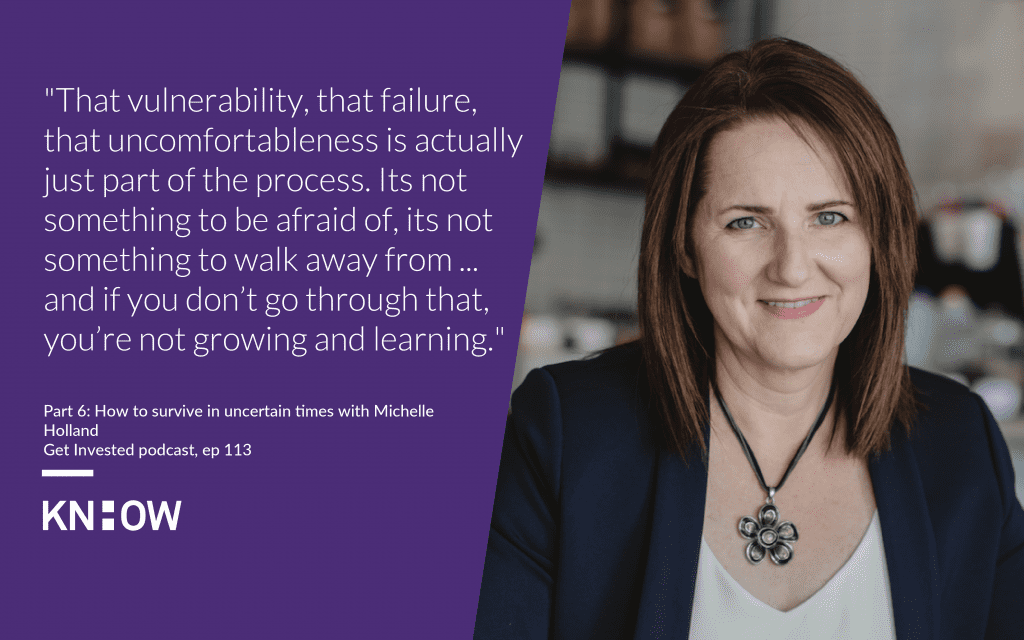Leadership expert Michelle Holland says vulnerability and addressing people’s emotions is a crucial part of learning and growing in business.
A self-professed culture warrior and recognised thought leader in the organisational culture space, Michelle knows what it takes for leaders and businesses to thrive in the midst of uncertainty and vulnerability.
She told Bushy Martin on the Get Invested podcast that she saw COVID-19 as an example of ‘complete and utter collective vulnerability’.
“I don’t think that there has been a time where collectively, not just in Australia, but globally, we have had a period where we’re all in this completely uncertain time of going ‘I don’t know what’s going on‘,” Michelle said.
But she says it’s not something to shy away from, but instead embrace and accept in order to move forward.
“That vulnerability, that failure, that uncomfortableness is actually just part of the process. It’s not something to be afraid of, it’s not something to walk away from … and if you don’t go through that, you’re not growing and learning,” Michelle said.
“Recognise that there is fear or recognise there is grief, recognise also that there is excitement and opportunity in essence.”
The renowned speaker and entrepreneur explained that vulnerability can be defined by three factors – uncertainty, risk and emotional exposure.
Emotional exposure particularly refers to the fear, anger, frustration or grief many are experiencing and how they actually acknowledge it.
“Everybody’s scared … and this is their response to being scared. Underneath most negative behaviours and vulnerability there is fear. We’re just fearful and we respond in different ways. Some don’t want to get out of bed and others go into full attack mode,” Michelle said.
“This is an unfortunate thing in our society and in workplaces. We see this all the time as the amount of emotional intelligence is actually really low. So therefore, we don’t name it as fear or grief.”
She says the leaders and businesses which thrive during uncertainty and vulnerability are those that recognise these emotions and aim to help their employees and clients through difficult times. Michelle also said periods like these present the perfect opportunity to strengthen relationships.
“The businesses that are doing well are the ones that actually acknowledge those emotions in their people and they do something to help people cope during that time,” she said.
“And it might be as simple as going ‘hey, how are you going? Is there anything I can do? How can I help? What do you need?’ You know, just those simple questions are amazing.
“So, I think this is a really good opportunity for our leaders in particular to start to really either solidify the relationships with the people that they’re working with and or grow the relationships. Trust is built through those really small moments in time.
“They’re small and simple [actions], but they actually do have a good impact, and it’s also really important for particularly going through a change.”
Michelle said some of her clients have succeeded in these times thanks to their communication and expression of vulnerability.
“A number of our clients have been extraordinary in their communication. They’ve been sending out messages like ‘Okay. This is what we know so far. We don’t know this, but we do know this‘. That’s vulnerability,” she said.
“The myth around vulnerability is that it’s exposing and telling everybody everything about ourselves. Its not. It’s about recognising that we’re in an uncertain time, that we’re all a little bit fearful, that were having to let go of things that we might not want to let go of, that we’re going to have to take on things. And we don’t really know what they are yet.
“That’s vulnerability in leadership. It’s being able to be there with your people within this circumstance.”
Michelle hones in on the idea that businesses have the power to positively influence people with their communication and leave a lasting impression long after coronavirus subsides.
“People will forget what you do, but they’ll never forget how you make them feel. And I think that’s a really important thing for all of us to remember, because we can have a really positive impact and influence on someone, and also very negative one,” she said.
“Words have the power to heal and they have the power to harm. And it’s our choice that says what we’re actually going to do with that.”
Listen to the full interview here.
Want to Know How you can build wealth with the help of leading, qualified experts? Talk to the team at KnowHow, now.




